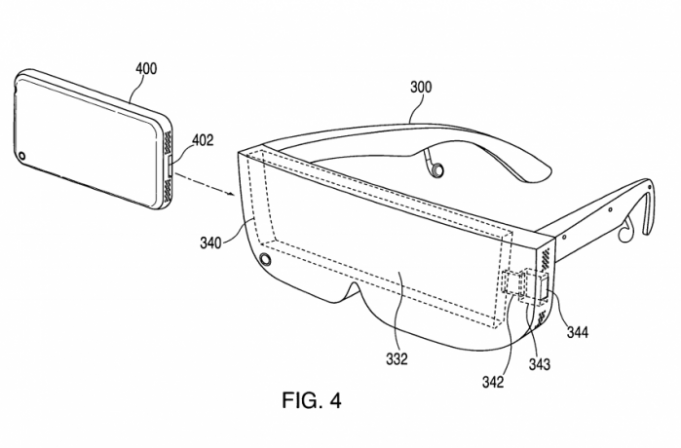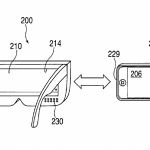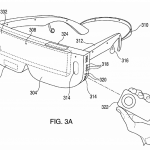Yesterday, Apple was granted a patent for a Gear VR-like mobile headset which would use a portable device (like a smartphone) as the primary display. The patent strikes similarities between both Samsung’s Gear VR and a swath of VR smartphone adapters out there like Google Cardboard. Patent attorney Eric Greenbaum tells us that the patent could have “broad ramifications” for mobile VR headsets.
With countless VR smartphone adapters and Samsung’s impressive Gear VR mobile VR headset available on the market, the idea of using a smartphone for a VR experience seems obvious. Back in 2008 though, when Apple filed a patent for a “Head-mounted display apparatus for retaining a portable electronic device with display,”—among the many patents the company has filed that sat on the shelf—who could have confidently said whether or not it would even come into play?
Of the many timelines history could have taken, we’re here now in 2015 when the virtual reality industry is growing at a blistering rate, and this patent, which appears to have been first noticed as granted by Patently Apple, is all too relevant.
Filed in 2008, published in 2010, and granted yesterday, the patent describes a device which sounds an awful lot like Gear VR and other VR smartphone adapters. Eric Greenbaum, patent attorney and founder of About Face VR, breaks down the core of the patent’s claim for Road to VR:
The language of claim 1 states (in my own words): A HMD [head mounted display] made up of a frame that is adapted to receive a mobile device such that the frame positions the mobile device in front of a user’s eyes and presents visual content to the user, and where the HMD has a detection mechanism that ‘tells’ the mobile device when it is mounted on the HMD. There is a final clause in the claim that involves an optical assembly that makes some adjustment to the image from the mobile device screen. I find the claim language a little bit vague and I’m not completely clear on what it means.
Greenbaum told me that “The apple patent may have broad ramifications for mobile-device based head mounted displays.” Which I take to mean, Apple could have a case on their hands if they wanted to challenge Gear VR or similar devices in court.
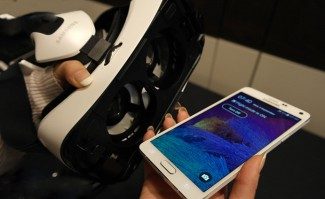
The timing of the patent issuance caught my attention. According to the communiqué between Apple and United States Patent Office, the company was given a Notice of Allowance—acceptance of the patent’s claims—on November 5th, 2014, just two months after Samsung revealed Gear VR, and a month before the device went on sale. While Greenbaum noted that “Apple had been pretty diligent about prosecuting this application for the last seven years,” he agreed it was possible that Gear VR may have put pressure on Apple to get the patent through the system.
“The patent process is a negotiation between the applicant and the patent office,” he said. “The applicant wants the broadest protection possible and the patent office wants to limit the breadth of the claims to only that which is new, useful and non-obvious over the prior art. It’s conceivable, and mind you I have no information or opinion on this matter, but it’s conceivable that Apple compromised on the language of their claims to accept language acceptable to the patent office so that the patent would issue. They may have seen the release of the Gear VR as a reason to compromise.”
Indeed, on June 2nd, 2014, Apple canceled a series of former claims, nearly halving the patent’s total claims to 12. June would be four months prior to Samsung’s September announcement of Gear VR, though rumors of the device were floating around as of July and may have been known to Apple earlier.
See Also: Looking for a Job in Virtual Reality? Apple’s Hiring
It’s possible that other devices helped put pressure on Apple’s patent processing instead. Google Cardboard was announced at the end of June, with a number of similar devices announced or available back in 2013.
Ultimately, Greenbaum figures differently, saying “The fact that it was just granted is probably not related to Gear VR’s release. Apple would likely have wanted this patent granted sooner.” He told me that seven years was long, but not unheard of for the patent process.
Alas, whichever is the case doesn’t matter much. The fact is that Apple has indeed been granted a patent which could give it a strong case against Gear VR and Cardboard-like VR smartphone adapters. Greenbaum assess the patent’s potential impact on the industry:
Apple’s relationship with the VR industry remains an open question. So far we’ve heard no word of their planning any VR products. However their patent filings indicate a strong interest in the field and I would expect them to be planning something. Their model is generally to wait and see how things develop and then come in with a clean, easy, and simple to use product. I expect that pattern will be maintained with VR.
This Apple HMD patent is significant. I would say it introduces potential litigation risks for companies that have or are planning to release a mobile device HMD.
There is no duty for Apple to make or sell an HMD. They can sit on this patent and use it strategically either by enforcing it against potential infringers, licensing it, or using it as leverage in forming strategic partnerships.
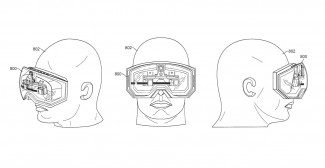 This is far from Apple’s first patent to touch on the virtual reality space. Among others, another patent filed in 2007 depicts a headset more reminiscent of the Oculus Rift and other standalone devices. Apple was granted this patent in December, 2013.
This is far from Apple’s first patent to touch on the virtual reality space. Among others, another patent filed in 2007 depicts a headset more reminiscent of the Oculus Rift and other standalone devices. Apple was granted this patent in December, 2013.

